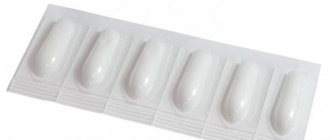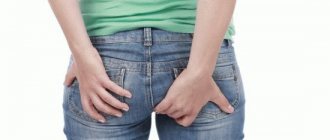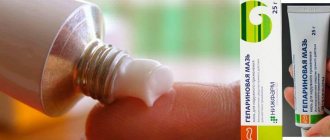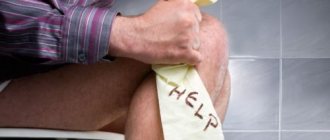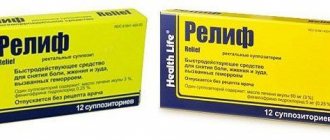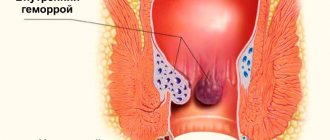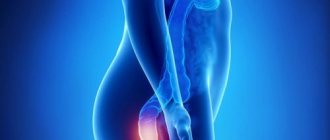External hemorrhoids during pregnancy: main causes
Hemorrhoidal disease is an enlargement and inflammation of the veins of the rectum with the formation of nodes. The pathology may affect the internal cavity of the organ or the external tissues of the anus. The most common diagnosis of external hemorrhoids in pregnant women is the formation and enlargement of nodes in the subcutaneous vessels located on the outside of the anus. The disease can be acute, that is, it can occur against the background of an “interesting situation” or worsen due to physiological changes in the body.
Provoking factors in this period are:
- congenital weakness of the vascular walls of the intestine;
- hereditary venous insufficiency;
- disturbance of blood flow in the pelvic organs;
- pressure caused by the growing fetus on nearby vessels;
- congestion in the pelvic area due to low physical activity;
- disturbance of digestion and intestinal motility due to a sharp change in taste preferences;
- problems with stool, constipation, traumatic mucous membranes;
- poor circulation due to severe toxicosis, swelling, high blood pressure;
- concomitant chronic heart and vascular diseases.
External hemorrhoids during pregnancy must be treated; they bring a lot of discomfort and worsen the woman’s difficult condition. After all, untreated pathology is fraught with complications in the form of thrombosis, infection, purulent inflammation of the perianal area. Such conditions are dangerous not only for the mother, but also for the unborn child.
Possible complication of external hemorrhoids during pregnancy
Possible risks
Compliance with medical recommendations during pregnancy - the birth of a healthy child
If therapy is not carried out after the discovery of external hemorrhoids, the inflammatory process will become more extensive. This is fraught with the occurrence of fistulas, the appearance of a perirectal abscess, and can lead to tissue necrosis. Such complications require emergency action. The addition of an infection is dangerous: intrauterine infection can occur. Toxins first enter the bloodstream and through the placenta to the baby.
If the cones bleed, the expectant mother may develop anemia. Iron deficiency during pregnancy requires immediate correction. It provokes oxygen starvation, which negatively affects the development of the baby.
You need to get rid of the disease before the baby is born. It is easiest to “remove” a pathological phenomenon in the early stages of pregnancy; as the fetus grows, inflammation progresses. Labor provokes an exacerbation of the disease: the passage of the baby through the birth canal leads to rupture of the nodes, which is accompanied by bleeding. In the absence of adequate timely therapy, there is always an exacerbation of external hemorrhoids after childbirth, and treatment of a complicated disease will be long and serious. Considering all the risks, at the first appearance of alarming symptoms you should consult a doctor.
How do hemorrhoids occur during pregnancy: symptoms
Hemorrhoids are a very insidious disease. At the beginning of its development, it can be practically asymptomatic, with mild discomfort, which few people pay attention to. As the pathology develops, painful symptoms increase, causing the woman a lot of trouble.
External hemorrhoids most often occur in pregnant women:
- a feeling of heaviness, a foreign body in the anus;
- feeling of incomplete bowel movement;
- permanent defecation disorders (constipation, diarrhea);
- itching, burning, pain during bowel movements;
- spontaneous pain in the anorectal area due to prolonged sitting, sudden changes in body position;
- increased painful sensations while walking, coughing, sneezing;
- weeping cracks in the perianal area;
- slight bleeding on toilet paper or underwear (massive bleeding in the external form of the disease is rare);
- painful lumps in the anal area upon superficial palpation;
- irritation and inflammation of the skin around the anus;
- general malaise, weakness, irritability, poor sleep and appetite.
External hemorrhoids and pregnancy are frequent companions. Therefore, you need to pay attention to even the slightest discomfort in the anus and not delay a visit to a gynecologist or proctologist. In the acute form, when the clinical picture develops rapidly and is very painful, immediate treatment is indicated. Advanced pathology without proper therapy is greatly complicated during the onset of childbirth and in the postpartum period, which should not be allowed under any circumstances.
External hemorrhoids during pregnancy and features of its treatment
Reviews from women
Valentina: “After giving birth, external hemorrhoids appeared, and I immediately went to the doctor. They prescribed baths with chamomile and calendula, sea buckthorn oil and Relief candles. Already on the third day, the pain became less pronounced, but discomfort was still present. The course of treatment lasted 2 weeks, after which there was a break. I was able to completely get rid of the bumps in only 2 months.”
Nadezhda: “I treated external hemorrhoids for a year after giving birth until I agreed to surgery. No suppositories or ointments, much less folk remedies, helped me. The discomfort after surgery was noticeable, but it was still much better than suffering from pain and discomfort.”
Treatment of external hemorrhoids during pregnancy with effective ointments
Conservative therapy is considered the safest and most effective way to treat hemorrhoids in pregnant women. The attending physician, based on the woman’s complaints, and most importantly, taking into account her “interesting situation,” will select an effective treatment that will not harm the unborn child. Most often, the external form of the disease is treated with ointments, gels and creams. Medicines in this form have virtually no systemic or embryotoxic effects.
Read also
Hemorrhoids in the 3rd trimester of pregnancy
How to treat external hemorrhoids during pregnancy:
Fleming's ointment.
Antihemorrhoidal remedy based on natural ingredients - aesculus, calendula, witch hazel, menthol. The herbal composition is absolutely safe for women, provided there are no allergies. When the pathology worsens, the nodes are lubricated with ointment several times a day until the painful symptoms are relieved. The drug relieves swelling and inflammation, dries out weeping cracks, and produces some analgesic and cooling effect.
"Levomekol".
How to use Levomekol for external hemorrhoids
External hemorrhoids during pregnancy are treated with this cream in short courses, and always as prescribed by a specialist. The combined composition of methyluracil and chloramphenicol quickly relieves inflammation, heals erosions, and relieves discomfort. Apply to the damaged area once a day, preferably before bedtime and after hygiene procedures.
"Bezornil."
An anesthetic ointment that effectively analgeses inflamed nodes. Additionally, it helps cope with bleeding, swelling, itching, and cracks. A semi-natural composition based on pearls, amber, borneol, calamine has an antiseptic and astringent effect. Apply morning and evening for 10 days.
Vishnevsky ointment.
A simple antihemorrhoidal remedy with a minimum of contraindications. Approved for use in pregnant women at any stage. Effectively disinfects, heals, regenerates tissue, reduces the intensity of the inflammatory process, eliminates itching and soreness. Can be used for a long time in the form of compresses on the anus. It is possible to be allergic to the birch tar, castor oil, and xeroform contained in the liniment.
“Posterized.”
Successfully treats external hemorrhoids in pregnant women without causing adverse reactions. It has pronounced anti-inflammatory, reparative, analgesic, and immunomodulatory activity. Heals damaged mucous membranes and tissues, prevents the spread of harmful microorganisms. For a lasting effect, it is enough to rub a small amount of ointment into the painful area twice a day for 4-5 days.
Pasteurizan - treatment of hemorrhoids during pregnancy
"Heparin ointment."
A potent drug based on heparin. Prevents thrombosis of nodes and helps to dissolve existing seals. The anesthetic contained in the composition additionally anesthetizes and removes unpleasant symptoms. During pregnancy, it is used according to strict indications, only in the 2nd and 3rd trimester. The treatment regimen is selected individually.
Read also
Remedies for hemorrhoids during pregnancy
We figured out how to cure external hemorrhoids during pregnancy. It is important to use ointments with caution, having first studied the instructions and consulted with a doctor.
Preventive measures
An expectant mother can prevent the appearance and stop the development of external hemorrhoids if she follows preventive rules. To avoid encountering an unpleasant problem, you need to:
- Adjust your diet. You should avoid salty and spicy foods, exclude smoked foods, fatty and pickled foods.
- Establish defecation. Foods rich in fiber will help improve intestinal motility. If acts of defecation occur rarely, then you should consult a doctor about the problem. He will select safe laxative pills.
- Increase activity. Walking and performing special exercises prevent stagnation of blood flow in the pelvic veins.
https://youtu.be/ssZYU91nfVY
Hemorrhoids are a “delicate” disease. Often pregnant women start it, I’m embarrassed to see a doctor. This leads to complications. The appearance of alarming symptoms is a reason to immediately consult a specialist. The sooner a problem is identified, the faster and easier it can be solved. Hemorrhoids are always complicated during the birth process. If possible, the pathology should be eliminated before delivery. Ideally, you need to take preventative measures and consult a doctor to prevent the onset of the disease.
Treatment of external hemorrhoids during pregnancy with suppositories
For the treatment of hemorrhoidal disease, the most effective are drugs in the form of rectal suppositories. They are gentle and quickly penetrate the mucous membrane. But during pregnancy they are not used so often due to possible absorption into the bloodstream and through the placental barrier. The doctor selects a suitable and safe drug according to individual indications.
How to cure external hemorrhoids during pregnancy using suppositories:
"Ichthyol."
Suppositories for topical use, the basis of which is a natural component - ichthyol. They have anti-inflammatory, analgesic, and antiseptic effects, while simultaneously improving blood supply to the pelvic organs. Prescribed to pregnant women with caution, under constant medical supervision. Directions for use: insert 1 suppository into the anus per day for a week. If necessary, the course of treatment can be extended or repeated.
Suppositories with ichthyol for hemorrhoids
"Natalsid."
Suppositories approved for use during pregnancy under medical supervision. The active ingredient – sodium alginate – helps cope with bleeding and inflammation. Heals cracks and wounds, stimulates the process of regeneration of the mucous membrane and tissues of the rectum. It is administered rectally 2 times a day for no more than 14 days.
"Hepatrombin G".
A drug that contains the anticoagulant heparin and the synthetic glucocorticoid prednisolone. Relieves inflammation, resolves thrombosed nodes, improves the condition of veins, removes itching, swelling, improves blood flow, and relieves pain. The active substances slightly penetrate the bloodstream, so the product is intended for the treatment of hemorrhoids during late pregnancy (after consulting a doctor). The treatment regimen is similar to Natalsid.
Rectal suppositories during pregnancy are used exclusively as prescribed by a doctor in short courses. They are especially effective for mixed forms of hemorrhoids, which are characterized by simultaneous inflammation of internal and external nodes with significant pain.
External hemorrhoids in pregnant women: treatment with traditional methods
Traditional medicine has a huge number of recipes for hemorrhoids. Some of them can be safely used by women carrying a child. The natural composition of such products is in many cases safer than pharmaceutical drugs, but at the same time is not inferior in effectiveness.
Read also
Suppositories with Papaverine during pregnancy
Treatment of hemorrhoids during pregnancy
External hemorrhoids during pregnancy - how to treat at home:
- An herbal sitz bath helps reduce inflammation, discomfort and soreness. A decoction is made from calendula, chamomile, St. John's wort and oak bark, cooled, and poured into a wide bowl. You need to sit in it so that the anus is covered with water. The procedure is carried out daily until relief occurs.
- An ice compress on the anus eliminates pain and stops bleeding. A piece of ice is wrapped in a clean cloth and applied to the painful area for 20 seconds. Can be repeated several times.
- Raw potatoes are a woman’s first aid for discomfort in the perianal area. One peeled and well-washed fruit is grated on a fine grater. The pulp is wrapped in gauze and applied to the anus for 10 minutes. This compress is made in the morning and evening with freshly cooked potatoes. Similar lotions are prepared from raw beets.
- Inflamed and swollen nodes are lubricated with natural honey, propolis, mumiyo, sea buckthorn oil, medicinal tar, and aloe juice. The effect of such ointments is not inferior to pharmaceutical ones.
- Rowan will relieve burning, pain and itching. Fresh berries are ground into a paste, mixed with a few drops of sea buckthorn (olive) oil, and laid out on a clean cotton cloth. The compress is applied to the swollen nodes several times a day.
- Herbal lotions work well against inflammation of external nodes. The decoction is prepared from 2 tbsp. tablespoons of sage, calendula, knotweed, chamomile, wormwood. The mixture is brewed in a liter of water, cooled and filtered. A piece of gauze is soaked generously in liquid and applied to the painful area overnight.
Despite all the safety of folk remedies, their use must be agreed with a doctor. The most effective option for getting rid of an unpleasant illness during pregnancy is complex therapy based on special antihemorrhoidal components and home methods. Don't forget about proper nutrition, moderate physical activity and good mood.
